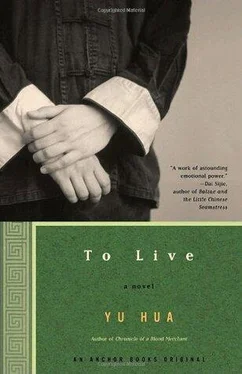It had been almost two months since anyone in the village had eaten rice. When we closed our door and smoke wisped out of our chimney, everybody saw. After we ignored that first guy who showed up, he went and told the others. Now a whole bunch of people were coming, and leading the way was the team leader. They figured we had some goodies, and everybody wanted a taste.
As soon as the team leader walked in, his nose twitched.
“What’s that you’re cooking?” he asked. “It smells great.”
I giggled but didn’t say anything. I figured if I didn’t answer him, the team leader would probably be too embarrassed to ask again. Jiazhen asked them to have a seat, but a few of them were nosy and went about looking in the pots and under the mattress. It was a good thing that the remaining rice was hidden in Jiazhen’s clothes; this way it didn’t matter if they turned things upside down looking. After a while, the team leader put a stop to the snooping.
“What the hell are you doing?” he said. “This isn’t your house! Leave! Leave! Get the fuck out,” he cursed.
After the team leader drove the others out he got up to close the door. Then, without even trying to chum up to us, he turned right around and said, “Fugui, Jiazhen, if you’ve got something good to eat, let me in on it.”
Jiazhen and I looked at each other. The team leader was normally pretty nice to us, and now here he was begging. How could we not help him out? Jiazhen reached into her clothes and took out that little rice bag. She gave the team leader a small handful, saying, “Team leader, that’s all I can give. Take it home and cook some rice soup.”
“That’s enough, that’s enough,” the team leader repeated.
The team leader had Jiazhen put the handful of rice in his pocket. Then, clasping his pocket with both hands, he laughed out loud and went out the door. As soon as the team leader left, tears fell from Jiazhen’s eyes — she was crying for that handful of rice. Seeing Jiazhen weeping, I could only sigh deeply.
The days went on like this all the way up until after the rice harvest. Although it wasn’t a very strong harvest, at least we finally had some grain, and things suddenly started to look up. But who could have known that Jiazhen’s illness would continue to get worse? By the end, she couldn’t walk more than a few steps. It was that terrible year that had ruined her health like this. But Jiazhen still wouldn’t resign herself to her condition. Even though she couldn’t work in the field, she insisted on doing housework. Leaning against the wall, she’d make her way around the hut to dust and sweep. Then one day she fell down, and no matter how hard she tried, she just couldn’t get back up. When Fengxia and I got home from working in the field, she was still lying there with an open scrape on her face. I carried her to bed, and Fengxia got a towel to wipe the blood from her face.
“From now on you’d better stay in bed,” I told her.
Jiazhen lowered her head.
“I don’t know why I couldn’t get up,” she whispered.
I guess you could say Jiazhen was tough. Even at a time like that she didn’t utter a single complaint or cry out in despair. While she was bedridden, she had me bring every piece of beat-up old clothing over to her.
“I’ll feel better if I have some work to do,” she said.
She unraveled the fabric and made new clothes for Fengxia and Youqing, and after the kids put them on, they really did look new. It was only later that I discovered she had also unraveled her own clothes. When I discovered what she had done I got mad, but she just smiled and said, “Clothes don’t last long if you don’t wear them. I’ll never wear those clothes, so what’s the point of them rotting away with me?”
Jiazhen said she’d make an outfit for me, too, but who’d have known that before she could finish she would be too weak to lift even a needle? At the time Fengxia and Youqing were asleep, but under the light of the kerosene lamp Jiazhen was still sewing my outfit. She was so exhausted that sweat dripped from her face. I kept telling her to get to sleep, but she would only sigh and shake her head, insisting she was almost done. After a while she dropped the needle, and as she reached for it her hand began to tremble. I saw her struggling to pick it up and bent over to get it for her. I handed it to her, but she dropped it again. Teardrops trickled down from Jiazhen’s eyes; this was the first time she had cried since getting sick like this. She thought she would never be able to work again.
“I can’t even get out of bed. What am I supposed to do with myself?” she asked in despair.
I wiped her tears away with my sleeve. She was so skinny that her bones were protruding from her face. I told her that it was just exhaustion, that even a healthy person wouldn’t be able to do the amount of work she’d been doing. I tried comforting her by telling her how Fengxia had already grown up and was earning more work points than even Jiazhen used to. I told her that from now on there would be no reason for us to worry anymore about money.
“But Youqing is still young,” said Jiazhen.
Jiazhen’s tears didn’t stop that whole night. She kept telling me, “When I die, don’t wrap me in a gunnysack. You have to use a fast knot to tie gunnysacks, so I won’t be able to undo it when I get to the other world. Just use a clean piece of cloth and that’ll be fine. And before you bury me, remember to give me a bath.”
Jiazhen continued, “Fengxia’s already grown up. See if you can find her a husband — that way I’ll be able to rest in peace. Youqing’s still small. There’s a lot of things he doesn’t understand, so make sure you don’t hit him too much and scare him.”
After hearing her go through all this, my heart felt wave after wave of sadness. I said to her, “Actually, I probably should have died long ago. So many people died during the war, but somehow I survived. Every day I told myself that I had to stay alive so I could come home and see you. And now you’re just going to abandon us?”
My words must have had some effect on Jiazhen, because the next morning when I woke up I saw her staring at me.
“Fugui,” she whispered, “I don’t want to die. All I want is to be able to wake up every day and see you and the kids.”
After a few days resting in bed, Jiazhen gradually started to get her strength back. Before long she could sit up in bed, and she said she felt much better. She was happy and said she wanted to try going back to the fields, but I wouldn’t let her.
“From now on you can’t risk wearing yourself out,” I said. “You’ve got to save your strength — we’ve still got a long road ahead of us.”
That year Youqing was in the fifth grade. There’s a common saying that “Calamities never come singly.” With Jiazhen as sick as she was, I was hoping that Youqing would grow up quickly. His grades were terrible, and I thought I’d better not force him to go to middle school. After he graduated from elementary school, I’d let him go with me out to the fields to earn work points. How could I have known that just as Jiazhen was starting to feel better, something would happen to Youqing?
That afternoon, Youqing’s principal, the wife of the county magistrate, lost a lot of blood giving birth in the city hospital— they said she had one foot in the grave. The teachers from Youqing’s school immediately called all fifth graders to the track and sent them to the hospital to donate blood. As soon as the kids heard that the blood was for the principal, they were so happy you would have thought it was a holiday. A few of the boys even rolled up their sleeves right there, ready to donate on the spot. As soon as they left the school gates, Youqing took off his shoes and, clutching them in his hands, started running toward the hospital with four or five other kids. My son was the first one to get there, and was first in the line that formed once the other students arrived.
Читать дальше












